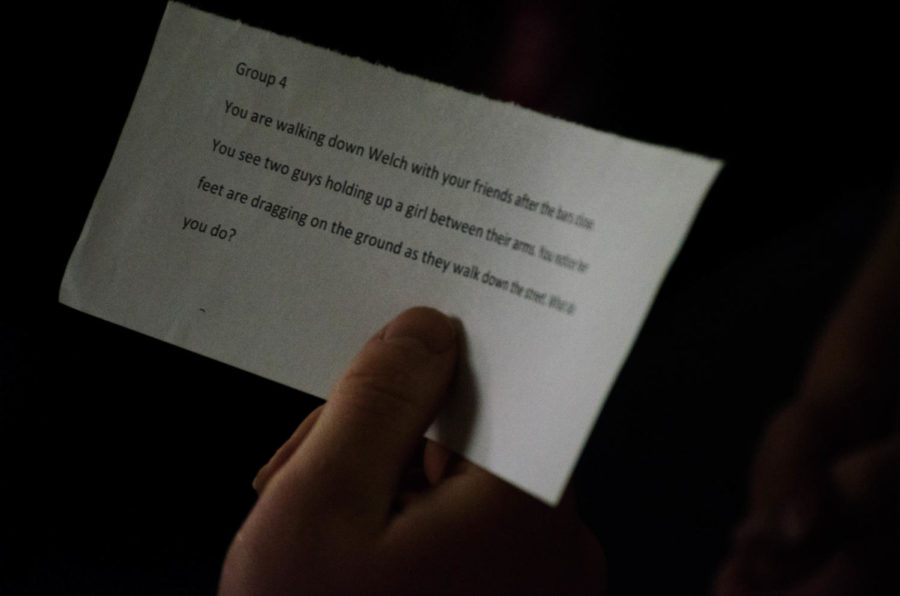ROTC, greek community share similar ideas in sexual assault awareness
Schuyler Smith/Iowa State Daily
A group of Phi Kappa Theta members look at a question about seeing problematic behavior. The fraternity had a discussion Feb. 16 with ROTC members about sexual assault and how to prevent it.
February 19, 2017
Trigger warning: This content uses language that may trigger sexual assault survivors.
Sexual assault is a complex and horrible issue. It is personal, it is heartbreaking and it is different in every case. But if we ever want to put an end to sexual assault, we have to stop letting its complexity get in our way.
This is the sixth story in a semester-long series where the Daily will publish a multitude of stories related to sexual assault, including discussions about various resources survivors can obtain if they are comfortable doing so.
— Emily Barske, editor in chief
Connections between the Greek community and the ROTC programs at Iowa State may seem hard to find at first, but the steps each take toward sexual assault awareness and prevention unite the two groups.
Both push education as one of the most crucial steps in preventing sexual assault and promoting awareness for the issue.
For the ROTC programs, much of their education on the topic stems from the participation in bystander intervention training. Each branch of ROTC — Air Force, Navy and Army — has multiple required sessions students must attend each academic year.
They also have a larger-scope sexual assault program, which — as another part of bystander intervention training — focuses on education about consent.
Bystander intervention training involves multiple parts, each centering on educating students about different aspects that revolve around sexual assault. The goal is to show the ROTC students how they can intervene early to prevent a conflict.
“As future leaders in the military, it’s important to take that and extrapolate it to all other areas of your life,” Capt. James Hamaker of the Air Force said.
The pyramid of violence, which is the idea that a chain of actions and ideas builds up to the actual assault, is brought up several times during bystander intervention training.
The bottom layer involves sexist jokes and rape jokes, which lead to building stereotypes, the second layer. These stereotypes lead to the next layer, verbal abuse and harassment. The top layer includes rape, sexual assault and abuse.
Bystander intervention training attempts to inform students about the layers. If students can work on preventing the bottom layers of the pyramid from forming, they will be able to halt progression toward sexual assault and harassment.
Shannon Writt, cadet in Army ROTC, explained that two parts of the training are applicable to people outside of ROTC as well. They each involve discussion among students about the aggressions that make up the bottom of the pyramid.
The discussion in bystander intervention training always circles back to the idea that intervention by one person early in the chain of actions can prevent a sexual assault.
Cadets Against Sexual Harassment and Assault (CASH/A) is an Army ROTC student group on campus with the goal of educating others on what the Army has taught them in bystander intervention training.
Andrew Cubit is the vice president of risk prevention for the Interfraternity Council at Iowa State, and one of his fellow fraternity brothers is an Army ROTC cadet. Last semester, CASH/A members came to their house and presented bystander intervention training for the fraternity.
“The CASH/A program has been useful for multiple chapters,” Cubit said. “… education from a similar authority level, student to student, to me is easier to learn.”
At its core, the ROTC centers sexual assault awareness on educating students with these steps, showing how they can help prevent it before it happens.
The greek community also promotes education to accomplish sexual assault awareness.
Throughout the year, many speakers are brought in to talk to greek students about topics relating to sexual assault and how to try to reduce and prevent incidents.
Cubit doesn’t believe that sitting and listening to a speaker is quite enough though. He organizes roundtables to discuss what students learned from the speaker and thinks that that reinforcement is key.
“Don’t let it die,” Cubit said. “If we can get the community to be constantly educating and following up on the information, I think we can see a drastic change in the amount of incidents happening.”
ROTC members participate in multiple activities a year geared toward sexual assault awareness and prevention.
“Even if you’re hearing the same information once a year, you have to reapply that to where you are, a periodic re-evaluation, applying it to your current situation,” Hamaker said.
ROTC also educates on topics like consent and setting proper environments. This education is just as important to bystander intervention in the awareness and prevention of sexual assault.
For the greek community, Cubit believes another important aspect of this education is the education of new members. Because they are often freshmen, new to the community and culture, he wants to make sure they know the basics as soon as possible.
“New members are the future for Iowa State and the greek community, and if we can start installing those ideals sooner rather than later, I think we’d see improvement,” Cubit said.
The greek community and ROTC both try to do all they can to take the necessary steps toward awareness and prevention of sexual assault.
Cubit and Hamaker agreed that the sometimes monotonous information shared during lectures and speeches on the topic can be hard to get across to students, but the importance of the topic means that they have to do their best to make the message known.
“These are conversations that if we bring up in natural times, at chapter meetings, at events, we will reinforce what we’re trying to teach everyone,” Cubit said.







